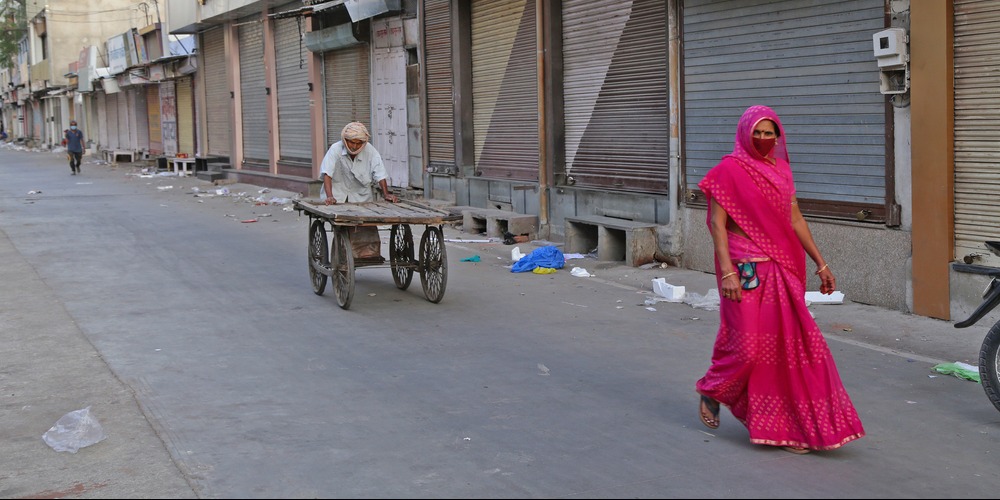India’s Ramadan business ‘crushed’ as second deadly COVID wave continues
Nihal Fatima and her sister run an online-offline Islamic attire business in the Muslim locality of Solapur in a faraway Mumbai suburb of Bhandup. Their new business, Saiyyada Hijab, was hit by India’s first COVID lockdown last year.
“Our stocks were stuck in transit for three months,” Nihal told Salaam Gateway.
“Clients who had paid for their orders could not be served. We were left with huge stocks in our warehouse which we got rid of in discounts after the lockdown eased last year.”
As the months went by, Nihal looked to Ramadan this year to recoup sales. Then India’s deadly second coronavirus wave hit, forcing her to stop taking orders altogether.
“Vendors are taking orders only under the condition that they should not be held responsible if stocks get stuck due to lockdown. Couriers are refusing to make home deliveries that don’t go down well with the end-customer,” she said.
Work-from-home entrepreneur Sana Ansari, from the same Mumbai hotspot, is facing similar problems. Before the pandemic, she had a flourishing business in mehndi cones and attar, which are in particularly high demand during Ramadan.
“The Indian market is such that people want to have a feel and touch of what they buy,” said Sana, who operates from Mohammad Ali Road-Crawford Market area, a go-to place for Ramadan shopping in downtown Mumbai.
The pandemic has made it impossible to meet demand, even if customers bought online as the logistics have become a nightmare.
“We cannot deliver, we cannot courier, we cannot source,” said Sana, explaining that these once-normal operations now take a long time.
Nihal’s and Sana’s situations are unfortunately typical now as India’s COVID cases reached a record 414,188 cases and almost 4,000 deaths in the 24-hours to 8am local time on Friday (May 7).
The country’s total coronavirus cases is 21.49 million today and deaths reached 234,083.
The surge comes at a time when vaccinations have dropped due to supply and delivery issues, despite talks in January that India could emerge as the COVID vaccine manufacturing hub of the world, and a mass inoculation program was rolled out.
Cities after cities were seeing a gradual easing of restrictions until the numbers started rising in February with big religious gatherings, the reopening of public places and congested election rallies blamed.
With the hospitals, cremation and burial services unable to cope under the weight of the pandemic, there is no “business as usual” as lockdowns return.
“Businesses have just got crushed to pieces,” said Farid Shaikh of the Aman Committee, a Mumbai-based social organisation that works mainly for the Muslim community.
He estimates that at least 150,000 to 200,000 workers have left the city of Mumbai due to closure of businesses.
One of those is Mohammad Saud Shingati, a semi wholesaler in textiles in Dubash Market in South Mumbai.
“Businesses in Ramadan register at least double the sale than they would normally do. One can take the business from 500,000 rupees ($6,793) to 1 million rupees during Ramadan and even 1.5 million rupees with better planning,” he said.
Sales have now dropped to zero and Mohammad Saud does not see any chance of recovery. He has closed his shop in the wholesale market and has headed to his hometown in Karnataka.
What little business there is has been downsized in the case of Syed Shakeel in Hyderabad, who has been in the bangles trade for more than forty years. His business, which used to thrive during Ramadan, has taken a huge hit with the night curfews imposed in the city.
“People come out to buy essentials and are afraid to venture longer for other things,” said Shakeel.
His workshop used to buzz with up to ten workers, operating twelve hours a day. Only two remain following the lockdown last year.
He thanks the Almighty that at the nick of time, he decided not to stock goods and sell whatever was available in-store. “Normally I would stock around 200,000 to 250,000 rupees worth of goods for Ramadan. This year I did not stock at all.”
He and his two brothers have vacated a warehouse and closed a shop, leaving them attending to just the one left.
Back in Mumbai, Mohammad Saud believes losses in Ramadan last year set trade back by two to three years. Businesses had hoped to recover during this fasting month but instead, they have been knocked back even further.
“You can’t hope for recovery at least for the next four or five years,” said Mohammad Saud.
His words only reflect the all-pervasive sentiment among small business owners to be ready for a painful long-haul, if not outright closure.
“The business will only come back when the coronavirus goes away, not before that,” said fellow Mumbai entrepreneur Sana with an air of finality.
© SalaamGateway.com 2021 All Rights Reserved

SA Kader